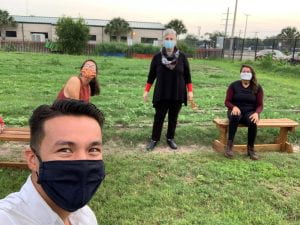by Dr. Elaine Hernandez
The McAllen regional office has been actively engaged with our local communities addressing access to nutritious meals during the COVID-19 pandemic. Unemployment in south Texas soared as high as 24%. The slowing of local economies resulted in long lines at food banks and food pantries, as well as other emergency food distribution programs operated by public and private organizations. In addition to this, non-congregate summer meal programs through school nutrition departments continued to feed their students during school closures. We have also seen an increase in enrollment in SNAP, which previously had seen a downturn of children’s participation in this safety net.
Debra Franco, our Child Hunger Outreach Specialist, assumed an active role in supporting our national Emergency Meals to You (eMTY) program, answering emails from across the country, addressing questions from school districts and families. Debra also directly supported the South Texas Juvenile Diabetes Association (STJDA) by helping to organize the daily delivery of over 100 fresh lunches to children at the Freedom Life Church in Mission, Texas. She was assisted by our Summer Americorps VISTA, Jennifer Guerra, in preparing and packaging over 12,000 meals, including feeding children enrolled in four virtual summer camps. Jennifer is a doctoral student with Baylor University and is the Department Chair for Culinary Arts at South Texas College.
Debra and Jennifer developed a survey to identify needs and impact of their grab-and-go lunch program. 82 surveys were completed and revealed the following:
- 56% of students had to skip lunch if they were unable to pick up their daily grab-and-go meal.
- 3% reported that one day a week the lunch they received at the distribution site was the only meal the child ate.
- 8% reported that the lunch was the only meal they ate for two days out of the week.
- 2% ate only the lunch three days out of the week.
- An alarming 31.7% reported that the grab-and-go lunch was the only meal eaten for four or more days out of the week.
The reasons for the need for meals varied. However, the school closures were a clear barrier for access to food with 91.5% reporting this as a key factor for needing the meals. Other factors creating need included a loss of employment due to COVID-19 which was reported by 69.5 of the respondents and a lack of financial resources reported by 86.6% of participants.
The results of this survey and personal testimonies shared by families have strengthened Debra’s drive to work towards a hunger-free community in our region. Debra has also worked with a church in Weslaco, Texas, to start a community garden and grow fresh vegetables for low income families in the mid-Valley region. She helps STJDA offer a monthly food pantry to 52 low income families living with diabetes, and who are challenged in accessing insulin and medical attention. Debra truly enjoys working directly with the community and you see this in her commitment to ensure all children has access to affordable nutritious meals.

The McAllen office has been assigned a second Americorps VISTA, Marina Vergara, for 2020-2021 to strengthen the engagement of stakeholders in local coalitions. Her background is in sustainable agriculture and she recently returned from serving in Panama with the Peace Corps. Marina is helping to re-start the RGV Border Health Coalition with its first virtual meeting on September 3rd, organizing speakers and presentations, and providing backbone support to the coalition. She is also supporting the creation of a new coalition focusing on youth with disabilities who are 18+ years old and who have an interest in learning gardening, food preparation, and micro-business management using products grown in a community garden.
The Regional Director, Dr. Elaine Hernandez, is working with Marina in developing a new food security coalition led by the First United Methodist Church in McAllen. The goal of this coalition is to identify neighborhoods interested in starting community gardens and learning agro-product development related to the food industry. Elaine and Marina are also collaborating with IDEA Public Schools and their Farm to School program where we will support seventh graders in learning about food insecurity and local solutions to hunger, using the County Agrilife Extension program “Junior Master Gardeners” to learn about food production both at school and at home. They are also participating in the “Make the First Five Count” coalition with Easter Seals of the Rio Grande Valley, the Equal Voice Network coalition with Projecto Azteca, and the Collaborative Action Board with the School of Public Health at the UT-Houston/UTRGV campus in Brownsville.

Dr. Hernandez promoted the eMTY program in South Texas through the Region One ESC and the Rotary District 5930, resulting in 5 school districts and over 15,000 children receiving boxed meals delivered to their homes. She also helped the School District of Puerto Rico in promoting eMTY in pre-selected rural communities.
Dr. Hernandez took to heart the expansion of our state-focused Texas Hunger Initiative into the global Baylor Collaborative on Hunger and Poverty and began virtually reaching out to Central America, working with Dr. Victor Hinojosa of the Baylor Migration Project, and collaborating with the National Autonomous University of Honduras and the Rafael Landivar University in Guatemala to develop hunger-free coalitions addressing COVID-19 and migration of unaccompanied children.
The Baylor Collaborative on Hunger and Poverty seeks to change the lives of people living with food insecurity using proven, research-based methods. The methods are almost always developed in the “learning labs” of our regional offices, and our team in the Rio Grande Valley is a great example of how this is happening!
_________
Dr. Elaine Hernandez
